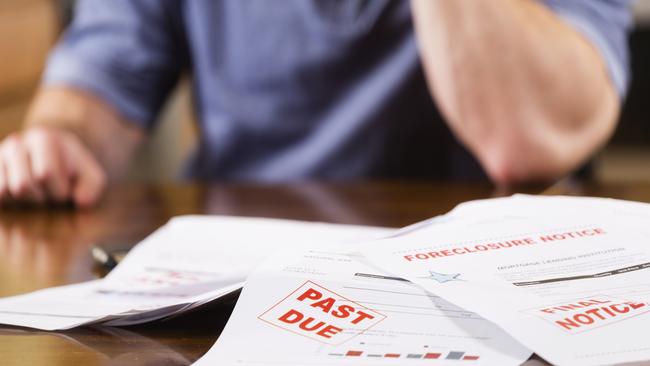Barefoot Investor: The $10k mistake you should avoid making
More than 1.8 million Australians have seized on the chance to dip into their superannuation. But family finance guru Scott Pape details why it could be a very bad decision.

Barefoot Investor
Don't miss out on the headlines from Barefoot Investor. Followed categories will be added to My News.
Do you have $10,000?”
I was sitting in the back of an Uber when my driver grunted this muffled request through his face mask.
“Sorry … what?”
His piercing eyes stared back at me through the rear-view mirror.
I started to feel a little nervous.
Why was this dude asking me for ten grand?
And why were the doors locked?
And why the hell was Phil Collins playing on the radio?
In frustration my driver pulled down his mask and repeated (clearly this time), “You’re the Barefoot Investor, aren’t you? What do you think I should do with the $10k I took out of my super?”
Ah-ha! Now it all made sense. In fact, I’ve been getting that question a lot lately.
One financial counselling client of mine, in his mid-30s, took his $10,000 and gambled the lot inside of a week.
He plans on doing the same with the next $10,000 he can apply for.
(Though this time he assures me he’s going to win.)
More than 1.8 million applications for a total of $14.8 billion have been approved, and I’ve come to realise that people are doing it for three main reasons (other than to feed their addictions).
First, there are people who are using it for the purpose it was intended: maybe they’ve been laid off or have lost hours and they want a cushion for what promises to be a very long winter.

In that case, I’d keep the money in a high-interest saver — preferably with a bank you don’t owe any money to (otherwise they may suggest you swipe it to ‘help’ pay off your loans). There are some sweetheart teaser offers at the moment, like Macquarie Bank’s online saver, which pays 2.65 per cent for four months before reverting back to 1.35 per cent p.a.
Second, there are young people who are saving for a deposit. Depressingly, Treasury figures show that almost half a million people under the age of 30 have accessed their super.
Now I understand the motivation to own a home, but I don’t really like raiding your super to do it.
In this case, if you’ve satisfied the requirement for early release, it also means you need to work on boosting your income so you can get a loan.
And finally there are people like my Uber driver, who admitted that he didn’t need the money:
“I just figured it was better off in my hands than theirs.”
He was in his mid-50s and explained that he planned on retiring in a decade or so.
Well, if you’re going to invest the money in the share market you need to take at least a 10-year time frame.
Reason being, in the current climate there’s a very real possibility that you could be underwater for many years.
And the best place to invest in index funds for the long term is … via your superannuation fund!
Tread Your Own Path!
MY FINANCIAL PLANNER HATES YOU
JEFF ASKS: We’ve just come back from seeing our financial planner, and I am a little rattled!
Our super fund is competitive in terms of earnings but its fees are 2 per cent pa.
When I questioned the fees (our pension balance is $1.1 million, so around $22,000 each year), he said that what matters is returns, not fees.
And when I mentioned that I had read your book, he got quite angry and dismissive.
He said that it is not so hard to beat the averages (because index funds hold lots of dud stocks). He waved away my concerns and said there were numerous errors in your book. He got a little worked up, so we did not want to push things with him. Just wanted to let you know!
BAREFOOT REPLIES: I totally understand his reaction.
See, I wrote the second best-selling book ever in Australia (the first was Fifty Shades of Grey). And my book also delved into bondage, dominance, and sadism — of the financial fees variety. I showed the masses how the game is played (and how they’re played).
Here’s the rough sum: a balanced portfolio will provide an income of around 4 per cent per annum.
That means, in your case (paying 2 per cent in fees), you’re losing around half your potential investment income each year.
And remember, you’re taking all the risk.
Also remember that actively managed funds (like the ones your adviser is hawking) fail to match simple low-cost index funds over the long term after fees, according to every study that’s ever been done on the subject.
So it’s not surprising he’s being defensive: remember, the fees you pay are his income.
Look, I’m not anti-adviser. In fact, I say repeatedly in the book to seek out a financial adviser who’ll give you personal advice tailored to your situation.
My motivation for writing the book was to empower my readers to ask the right questions (which you did). And the truth is, the best advisers want their clients to be educated and informed.
Maybe it’s time you found one.
SHOULD I BAIL OUT MY BRO FROM A MILLION-DOLLAR MESS?
HASSAN ASKS: My dad died three years ago and left his house ($1 million) and super ($200,000) to my brother, and made me the executor.
I was self-sufficient, so Dad told me I would not receive anything. Fair enough — I respect his wishes.
Now my brother and his adult kids have almost run out of cash and are looking to me to bail them out, the way Dad always did. But I have my own family!
How can I help my brother manage his affairs without preaching to him?
BAREFOOT REPLIES: Plenty of people in your situation would’ve been bitter about not getting any inheritance, but not you. Instead, you were concerned about your brother’s needs, not your own.
That is deeply impressive.
So your next decision should continue in the same vein: it’s all about what’s best for him (and his kidults).
And giving them money is not it.
Your father’s money simply enabled his poor behaviour. It hindered rather than helped him. So deciding to give him more money would be like buying an alcoholic a beer because they’re thirsty.
My view?
Offer to help your brother to set up his basic spending buckets — and even be an ‘accountability partner’. Or, if that’s awkward, support him to go and see a free financial counsellor (call the National Debt Helpline on 1800 007 007).
Your old man understood that you were strong enough, both financially and emotionally, to make it on your own, and that’s why he didn’t feel the need to give you any money. He was right.
Your brother is the real winner, though. You’re not only someone who can be a good money mentor, but you sound like a great bloke too.
Good luck.

FROM $500 TO $15,000
RACHEL ASKS: I do not have a question, I just want to say thank you.
Two years ago I walked out of an abusive relationship with $500 to my name and debts that should never have belonged to me.
My sister and brother-in-law gave me your book and I quickly decided this was how I would take control again.
After two years of hard work and sacrifice, I have paid off all my debts and saved almost $15,000, and I am hoping to buy my first home at the end of 2020.
I keep all of your columns in a folder called “YOU CAN DO IT” — and I did!
BAREFOOT REPLIES: I love celebrating the wins of the Barefoot community.
Yet I love it even more that right now, hundreds (if not thousands) of people in abusive relationships are reading your story and getting a little inspiration and motivation from hearing about someone who’s done it.
You Got This!
If you have a money question, go to barefootinvestor.com and #askbarefoot
The Barefoot Investor holds an Australian Financial Services Licence (302081).
This is general advice only. It should not replace individual, independent, personal financial advice.
The Barefoot Investor for Families: The Only Kids’ Money Guide You’ll Ever Need (HarperCollins) RRP $29.99
Originally published as Barefoot Investor: The $10k mistake you should avoid making
